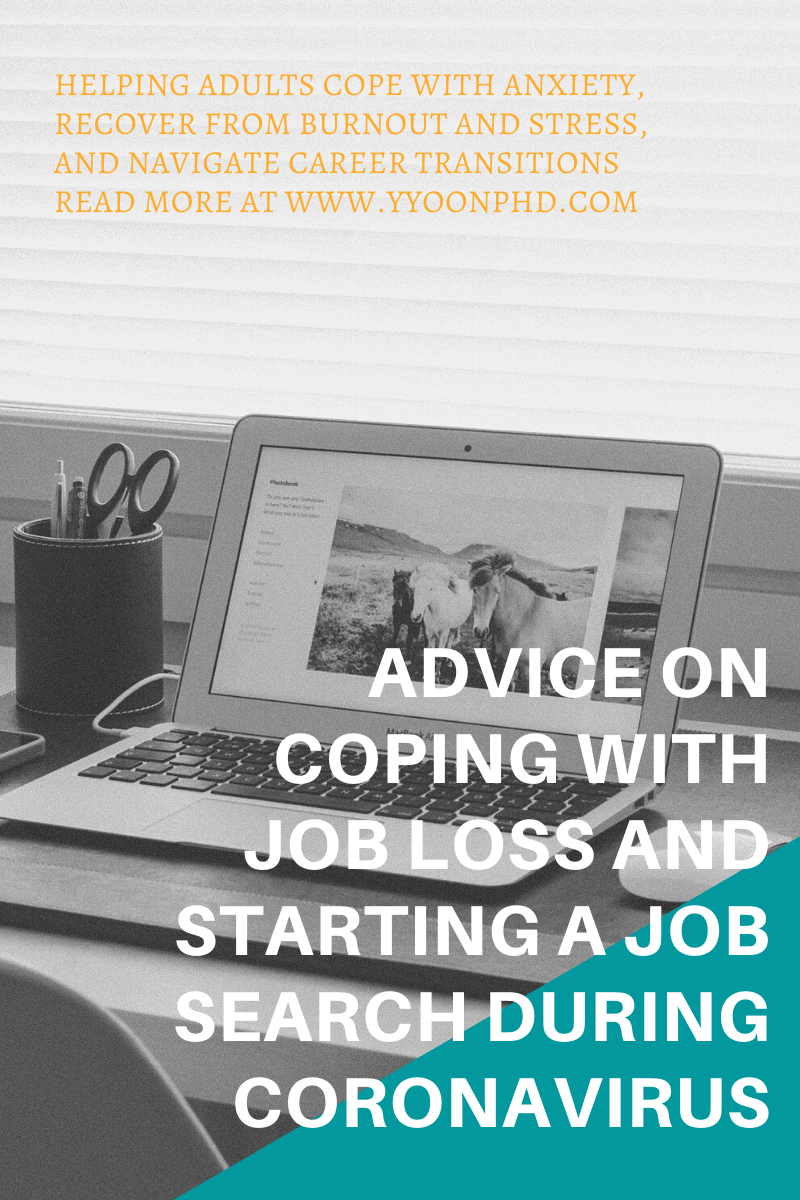During this time of COVID, you may have been directly impacted by the tremendous losses in the job market. If you lost your job recently, then first off - I am sorry. I am sorry for the fact that you are experiencing something out of your control on top of many other uncontrollable circumstances. Losing a job can increase one’s sense of anxiety, financial stress, and fear of the future. There are certainly many others going through a similar struggle but that does not take away from the hardship you yourself are experiencing because of current unemployment during COVID.
Last week in this post, I shared a bit about what it has been like for me, as a psychologist in private practice in NYC, to adjust my work and personal life as a result of COVID. As an independent business owner, there is always a certain level of uncertainty and potential job instability lingering at all times regardless of a pandemic. To that end, I share some of the sentiments I have heard from clients, friends, and family members who have been directly and indirectly affected by the recent surge in unemployment in the U.S. due to COVID.
I also recognize, however, that it is another level of stress when you are out of a job completely and find yourself in a situation in which you are questioning the financial means you have to pay for bills and essential needs. It is another layer of stress when you have to confront the question, “What’s next?” and mentally re-orient to embarking on a job search process you did not anticipate.
Today I am sharing advice on coping with job loss and starting a job search process. I will end with some practical steps you can take to jumpstart your job search process. Most importantly, I strongly recommend you take the time to attend to some of the emotional “inner” work first so that you can effectively embark on those practical job search steps. So, please don’t skip the first few steps outlined below!
Things to Remember After You’ve Lost Your Job (whether it’s due to COVID or not)
First and foremost, Be patient with yourself and allow some time to emotionally recover.
While it is tempting to launch yourself straight into a job search and pull up your resume and cover letter, it bears reminding you that you’ve just experienced a big change. With big change comes loss. And with loss comes a lot of different feelings, some of which may be very difficult.
What are some feelings you’re having because you lost your job?
Are you feeling angry? Helpless? Sad? Anxious? Or are you feeling relief because you hated your job but also feeling stuck because you’re not sure where to look next?
All of these feelings are valid. It is important to repeat that to yourself and remind yourself and anyone else in need of reminding. Be compassionate and kind to yourself and those feelings you’re having because there is no amount of pummeling through them or being angry at those feelings that’s going to speed up this recovery process.
Nevertheless remember that your feelings are not fact. What I mean by that is, even if you feel like a failure or you feel like you’re doomed, this is not a fact.
Be careful not to over-identify with or get too fused with the thoughts and feelings you’re having about your job situation.
You are not your job nor is your self-worth determined by a lack of a job.
Your response to your situation will help determine how this situation will pan out. This brings me to the next tip which has to do with your attitude and determination about the future.
Keep your head up and your eyes forward on the future to help pull you forward.
Your attitude will make a difference in how you bounce back from this situation. I’m not saying “Just be positive and everything will turn out just fine!” *insert eye roll*
What I am saying is that re-framing this situation as an opportunity to grow and taking this time to reevaluate your priorities and your career interests can lead to more positive outcomes in the long run.
Why might this be helpful? Because often we get stuck in old situations just out of habit or complacency. The same goes for careers. A job you were used to having may not have necessarily brought you much joy or fulfillment. So, bouncing back from a job loss will also require you to think of the future and what it can hold in terms of new opportunities. As I said before, your worth and your future is not determined by the current loss of a job.
Looking forward and maintaining some future-oriented attitude about what your career path has in store will help you bounce back faster and learn much more about yourself. This leads to the next tip: re-envisioning your career story.
Take this time to reflect on and re-envision your career story
You can learn a lot about yourself by reflecting on what you have accomplished so far. Take these reflections to help inform your next steps.
Here are some reflection questions about your career:
What have you learned from your past work experiences about your skills, strengths, and interests?
What were some memorable experiences you had in your last job(s)?
What did you most enjoy and what did you least enjoy?
What do you hope to take away from these experiences into your future?
Next, re-envision a future career path. In other words, What is it in your career that you would like to see yourself doing in the next year? In the next five years?
If you are more risk-averse, then maybe now is the time to consider what might feel a bit more risky but is actually timely and important to try now when you have this open door. You can treat this sort like a “fresh start”. Don’t feel like you need to pigeon-hole yourself into doing “one thing” or just one job role or title. Now is the time you can afford to be more flexible, think outside the box and challenge yourself to reach towards things you may have been interested in but had not thought to pursue.
If you have typically been more of a risk-taker and you’ve been trying a lot of new things prior to this recent job search, then you may benefit from thinking hard about how to create a thru-line or an arc to your career story. Identify some themes that are emerging from your work experiences. These themes and similarities across your experiences will help inform your next steps. Having a bit more clarity and focus about your career experiences can help direct you towards the most relevant opportunities instead of veering too off-course.
Where to Begin with Your Job Search
When you are more emotionally and mentally prepared, start investing now in your networks and building key relationships!
As promised, here is some advice on how to get moving on a job search. The following are some concrete steps you can take on your job search along with your more future-oriented proactive attitude:
Begin identifying potential job roles and titles that pique your interest
Look at job postings and roles on forums like LinkedIn and Indeed.com. Make a list of roles and job titles that are of interest. This research will help inform what is interesting to you, what transferable skills you possess, and what potential gaps in experience or information need to be addressed through informational interviews, upskilling, and/or taking short-term projects to gain experience.
Build out your target list for informational interviews
Once you have a better sense of what types of job positions and industries you are interested in, you can begin networking and investing in relationships to learn more about positions and opportunities.
Remember, you don’t have to start networking from scratch! Leverage your existing network. Don’t be afraid of accessing the relationships you have had over the course of your career.
Start by building out a target list of key people to speak to. Your goal from these brief conversations is to get advice about pursuing potential job opportunities and roles. You can also glean helpful information about the work they do and how they achieved their career success. Lastly and most importantly, investing time in these key people now will help to expand your network even further.
Leverage your unique position to connect with people near and far using remote/virtual conferencing.
For better or for worse, because everyone is sheltering in place and practicing social distancing, Zoom or virtual meetings are happening more readily. Virtual meetings are making networking more accessible in some ways, perhaps even more so than they were before when we were all busier and would require travel and much more coordination with schedules. Honestly, people are quite happy to connect right now! Take advantage of this unique period of time of networking. Now is the time to have those key conversations.
You may be thinking: “But what’s the point in talking to these people now if there are job freezes or people are so unsure of what’s going to happen in the near future in terms of jobs?”
You must invest your time in those relationships now. The point of these informational interviews and networking meetings is to get on people’s radar, ask for advice, and build up your network of contacts. Networking is a long game. In other words, the work you put in now is for the long term. These meetings will help you in the long run (and potentially in the short term too!).
I will write more in an upcoming post about informational interviews and networking skills.
Summary
Job loss and unemployment is hard and it really sucks, whether or not it has come about due to coronavirus. It may be difficult to cope with feelings associated with losing your job when you’re also navigating so many other life changes. While this is being written during the period of coronavirus, these steps are certainly relevant any time you have experienced a sudden job loss and unemployment.
That is why it is firstly so important to be kind to yourself and take care of yourself. Surround yourself with encouraging people who are there to support you and remind you that you can bounce back from this. First prioritize taking care of your body and mind so you can feel ready to embark on the job search process.
Keep a proactive future-oriented attitude about your career and remember there are concrete steps you can take to feel more in control of this situation. This proactive attitude will help motivate you.
Reflect and re-envision your career opportunities. Think about your interests and skills and re-evaluate your priorities and what you would really like to do in your career. Again, this is an opportunity to re-build and hopefully you can adopt an attitude that is founded in this belief.
Start investing in key relationships now and don’t be afraid to tap your current network. Start reaching out to people who can provide you with advice and tips on the job search and connections to others.
In the meantime, be well and healthy! Do not hesitate to reach out if you need support managing your anxiety through these challenging times of COVID-19 and to help you with the career transition and job search process. I am happy to help you rebuild your confidence and reach your personal and career goals.


